Learn
W.C. Handy
William Christopher Handy was born in Florence, Alabama on November 16, 1873. His parents were former slaves, and his father was a preacher in a local congregation.
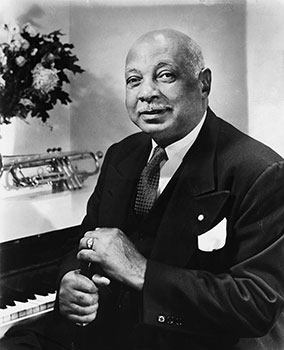
See larger version of W.C. Handy's portrait photograph here. Image from Corbis, 2006, via Discovery Education Streaming.
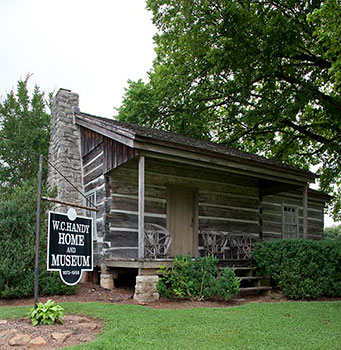
W.C. Handy was born in this small log cabin in Florence, Alabama. Image courtesy of the Library of Congress, Prints & Photographs Division, photograph by Carol M. Highsmith [LC-DIG-highsm-08585]. See larger version of his home here.
Handy's father, Charles Barnard Handy, did not want his son to be a musician, but Handy secretly followed his dreams. He even saved up money as a teen and bought a guitar and a cornet, a brass instrument similar to the trumpet but smaller in size and a more mellow tone quality, shown below, without his father's knowledge.
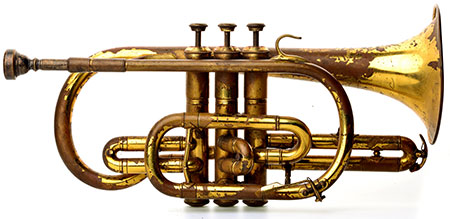
The cornet is a member of the brass family.
In 1892, he spent time as a teacher in Birmingham, Alabama; he also worked in Bessemer in a pipe works plant. While there, he organized the Lauzetta Quartet and taught music lessons. In 1893, Handy travelled to Chicago in 1893 to play cornet at the World's Fair.
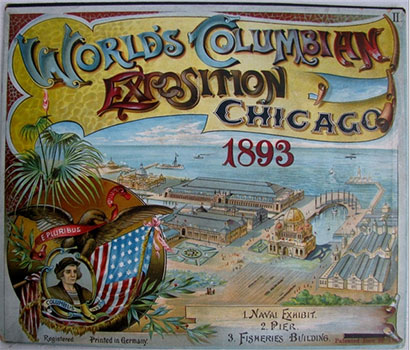
Cover to a pop-up book advertising the 1893 World's Fair, artist unknown circa 1893, scanned from the book The White City: Chicago's World's Columbian Exposition of 1893 by the Chicago History Museum.
From that point on, W.C. Handy stayed in the music industry. After the World's Fair, Handy accepted several positions in travelling bands, and he even returned to Alabama in 1900 to serve as the band director at Alabama A&M University.
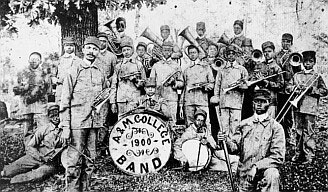
W.C. Handy and the band of the Teachers' Agricultural and Mechanical College (later renamed Alabama Agricultural and Mechanical University), in Normal, Alabama, in 1900. Handy (with a moustache) stands in the front of the group, on the left side, holding his cornet and conductor's baton. Image is in the public domain.
In 1902, while travelling through Mississippi, W.C. Handy heard a style of music performed by local self-taught musicians that he described as "haunting." This style of music was later called the blues, and W.C. Handy spent the remainder of his life composing and promoting the new genre to a worldwide audience through his company, Handy Brothers Music Company, Inc.
W.C. Handy's first hit "Memphis Blues" was released in 1912. Listen to a version below, along with several other of his most famous compositions, on the Library of Congress Jukebox.
- The Memphis Blues (recorded 1914)
- Yellow Dog Blues (recorded 1919)
- St. Louis Blues (recorded 1921)
- Beale Street Blues (recorded 1924)
In 1917, W.C. Handy moved his music business to New York City where he continued to publish and promote new music until his death from pneumonia in 1958. His company is still owned and operated by members of the Handy family in New York City, NY.
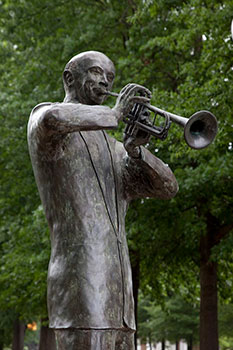
W.C. Handy statue in Florence, Alabama. Image courtesy of the Library of Congress, Prints & Photographs Division, photograph by Carol M. Highsmith [LC-DIG-highsm-08588]. See larger version of W.C. Handy statue here.
W.C. Handy earned the nickname "the father of the blues" because he is responsible for promoting the musical form to the world. Listen to the NPR story Hearing Voices: W.C. Handy (8:55) to learn more about the "father of the blues."
However, even with Handy's help, many early country blues musicians never gained the recognition they deserved.
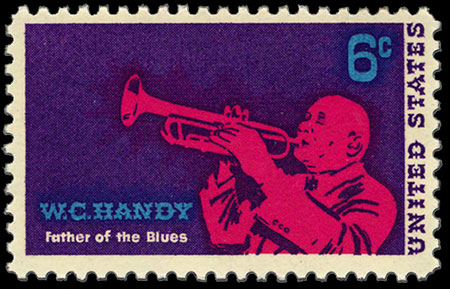
W.C. Handy was honored with a 6¢ stamp in 1969 for the 150th anniversary of the founding of Memphis, TN. Image is in the public domain, courtesy of the U.S. Bureau of Engraving and Printing.
